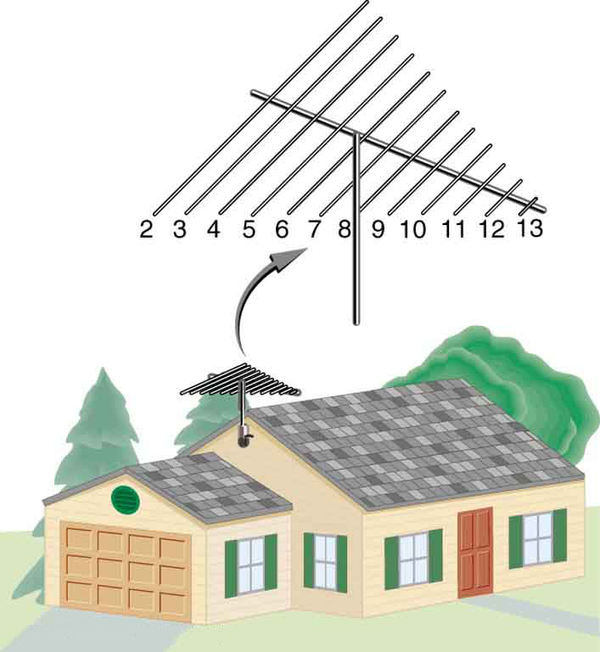| << Chapter < Page | Chapter >> Page > |
(a) What is the wavelength of 100-MHz radio waves used in an MRI unit? (b) If the frequencies are swept over a range centered on 100 MHz, what is the range of wavelengths broadcast?
(a) What is the frequency of the 193-nm ultraviolet radiation used in laser eye surgery? (b) Assuming the accuracy with which this EM radiation can ablate the cornea is directly proportional to wavelength, how much more accurate can this UV be than the shortest visible wavelength of light?
(a)
(b) The shortest wavelength of visible light is 380 nm, so that
In other words, the UV radiation is 97% more accurate than the shortest wavelength of visible light, or almost twice as accurate!
TV-reception antennas for VHF are constructed with cross wires supported at their centers, as shown in [link] . The ideal length for the cross wires is one-half the wavelength to be received, with the more expensive antennas having one for each channel. Suppose you measure the lengths of the wires for particular channels and find them to be 1.94 and 0.753 m long, respectively. What are the frequencies for these channels?

Conversations with astronauts on lunar walks had an echo that was used to estimate the distance to the Moon. The sound spoken by the person on Earth was transformed into a radio signal sent to the Moon, and transformed back into sound on a speaker inside the astronaut’s space suit. This sound was picked up by the microphone in the space suit (intended for the astronaut’s voice) and sent back to Earth as a radio echo of sorts. If the round-trip time was 2.60 s, what was the approximate distance to the Moon, neglecting any delays in the electronics?
Lunar astronauts placed a reflector on the Moon’s surface, off which a laser beam is periodically reflected. The distance to the Moon is calculated from the round-trip time. (a) To what accuracy in meters can the distance to the Moon be determined, if this time can be measured to 0.100 ns? (b) What percent accuracy is this, given the average distance to the Moon is ?
Radar is used to determine distances to various objects by measuring the round-trip time for an echo from the object. (a) How far away is the planet Venus if the echo time is 1000 s? (b) What is the echo time for a car 75.0 m from a Highway Police radar unit? (c) How accurately (in nanoseconds) must you be able to measure the echo time to an airplane 12.0 km away to determine its distance within 10.0 m?
(a)
(b)
(c) 66.7 ns
Integrated Concepts
(a) Calculate the ratio of the highest to lowest frequencies of electromagnetic waves the eye can see, given the wavelength range of visible light is from 380 to 760 nm. (b) Compare this with the ratio of highest to lowest frequencies the ear can hear.
Integrated Concepts
(a) Calculate the rate in watts at which heat transfer through radiation occurs (almost entirely in the infrared) from of the Earth’s surface at night. Assume the emissivity is 0.90, the temperature of the Earth is , and that of outer space is 2.7 K. (b) Compare the intensity of this radiation with that coming to the Earth from the Sun during the day, which averages about , only half of which is absorbed. (c) What is the maximum magnetic field strength in the outgoing radiation, assuming it is a continuous wave?
(a)
(b) 88%
(c)

Notification Switch
Would you like to follow the 'Concepts of physics with linear momentum' conversation and receive update notifications?